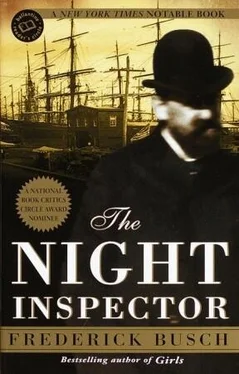Then, of course, the playing stopped, and then the lieutenant came from the tent, violin in one hand and bow in the other. I shot him as he emerged, putting the bullet into his chest, completing my murder of the finer arts and accomplished Southern manhood. These were deaths, I thought, trying to shield my eyes from the horseflies, that I would not describe to Sam Mordecai. Although he seemed, when he was with me in New York, to know more of my peculiar history than I had ever thought he might.


“YES,” HE SAID, “BUT A SHIPMENT OF PRECISELY WHAT?”
“A secret, Sam.”
“A shipment of secrets. Who but you, Billy, pitching into the trader’s game, would import a shipload of secrets? It is a path you would feel impelled to take. And who will buy these secrets once you have them carted and in stock?”
I said, “For once in a long time, this is not a matter of sale. Or of resale. This is a favor to a friend.” Homage to a friend, I thought. Obeisance to a friend. The gesture of a kneeling man who has no face. Has he the friend? Has she him?
“Trade between friends is said to be dangerous,” Sam said knowingly, and I turned to examine him as we walked west to Gansevoort Street and, from there, farther west to the river. Wagons and carters on foot crowded the street as the masts in the air above the street crowded the riverside sky over the warehouses and the seamen’s taverns. The masts and empty yardarms wobbled slowly in the warm, thick breeze, giving hints of the vessels beneath them, invisible to us, but exerting their massive weight on what we did see — ponderousness hinting the imponderable.
“How do you mean, Sam? That is: What do you know?”
His was the innocent face of a child, despite his being in his twenties, and despite his having been seasoned in our cruel engagements in the War. “Only what I say, Billy. That friends, it is said — it was said, in fact, by my father, who was a small tradesman all his life. He had a partnership at one time with a man from Georgia, by which I mean the country near Russia, not the state in which we — the bodies in the shed.”
“Yes,” I said, “the doll. En route to Milledgeville. The head of the little doll.”
He cleared his throat and spat upon the street, a common enough undertaking — our cobbles and paths were moist from the mouths of our citizens — but nothing I had seen him do. He was a fastidious fellow, bathing more than the rest of us, and wandering farthest from camp to attend to his stool. “My father,” he said hoarsely, “invested money with a man who was a neighbor in Boston and a friend. The man sold out their assets, cheap, because his wife became ill and he was in need of cash, and quickly, for surgeons and special foods. It was a disorder of the stomach. And my father lost a great deal of money, though his partner maintained his wife a few months more. He could not complain to the fellow, though he’d never asked my father or spoken in any way so as to suggest regret. Matters of trade and the amity of friends, he said, were not to be confused. That is all I know. Have I upset you? You sound perturbed.”
“It’s the mask,” I said. “It muffles me.”
“You sound clear as a bell,” he said. “Might I know any particulars of the dockland adventure you seem to have in store for us?”
“Let me tell you a story,” I said.
“But not in reply to my question, I take it.”
“I know a widow in the Points. She lives not far from me, with her two children.” I described the months at work in the Oregon gold fields, and the being transported by wagon to California. I told him that she had not spoken of the violence, but that her description of her husband’s death implied a suddenness the effects of which still gripped her, and that I sensed her withholding of matters of violence to her own person and to her mother. “I find her remarkably brave,” I told him, and I spoke of the boy and girl, and the large room and little room in which they lived with her and where she worked. I enumerated what I thought was the schedule of their days, suggesting the small steps of the children with their arms around the barrels of water from the pump, and the dragging, strong steps of Chun Ho as she transported twin baskets of clothing on the bamboo rod. I talked of her support from the fang , and how her mother lived with friends instead of with her because she would not raise her children in traditional ways. “She wishes, you see, to be an American. I find that … moving.”
Sam studied me as I spoke, as if he might read my expression, or, that failing, and it would, then find a suggestion of my feelings in the rise and fall of my voice.
“And is it for this person that we are engaged upon the secret matters?”
“No.”
“Perhaps it should be,” Sam said.
“Her children call me Gui.”
“Gooey’s a lump of mucus, Billy, among the soldiering men. These children must hold you in some strange regard.”
“Gui , apparently, means devil. Or ghost. It’s the mask, of course.”
“The Secessionists called you a ghost, I remember, or think to remember. It is how we used to say they thought of you. But now it’s a pet name, I take it. Something to do with endearment? Something like, oh, Daddy? Uncle, at the least?”
“Thank you, Sam. No.”
“Perhaps it should be,” he said.
As we clambered down the wooden steps from the shipping office to the cargo dock, I was thinking of Jessie’s voice, and how I had tried to read it — hence, the familiarity of Sam’s expression as he attempted reading mine. She sat at her little writing desk with its several compartments and its folded-down front, and I stood to its side. It was as if she were my employer, and I had come to report. Her fine, golden features were composed and without much evidence of her thinking. I found her eyes impenetrable, light and flecked and as focused within as M’s small, dark eyes were inward in their attentiveness. She was always fond with me, and I never feared for the loss of her feelings, although I could not have summarized their nature. But she was removed that afternoon, and I felt a bit like the man who sees a vessel unmoored and speculates. At what rate did the dock grow smaller to a man on board the ship? At what rate did the ship grow smaller to a dockside observer? Something was happening, and I could not name it. I thought of describing it for Sam, who seemed able to reduce any event to a set of employable words. It was M, of course, who might sum it up philosophically. But I found that I did not wish to know. I simply thought of her writing desk, and of her distance from me, and how I strolled the room, attempting not to yammer and stumble in my speech. We discussed the contents of the telegraph message she had, and we agreed on further messages to send and to expect to receive.
Jessie looked down at her desk and then, raising her low voice to transcend the noises from the Yorkville streets, and pulling at the balloon sleeves of her dark red dress, she said, “You have a great need to touch me, haven’t you, Billy?”
“Now, do you mean? Or all of the time?”
“This minute.”
“Yes. I didn’t think so, but yes.”
“You find me distant?”
“A little, I think.”
“Men need to penetrate what will not otherwise stay to hand? You fuck me to keep me?”
“I do not know what men need, Jessie. I do not always know what I need. And I wonder how anyone might keep you, if you mean against time or the attentions of others.”
Читать дальше














